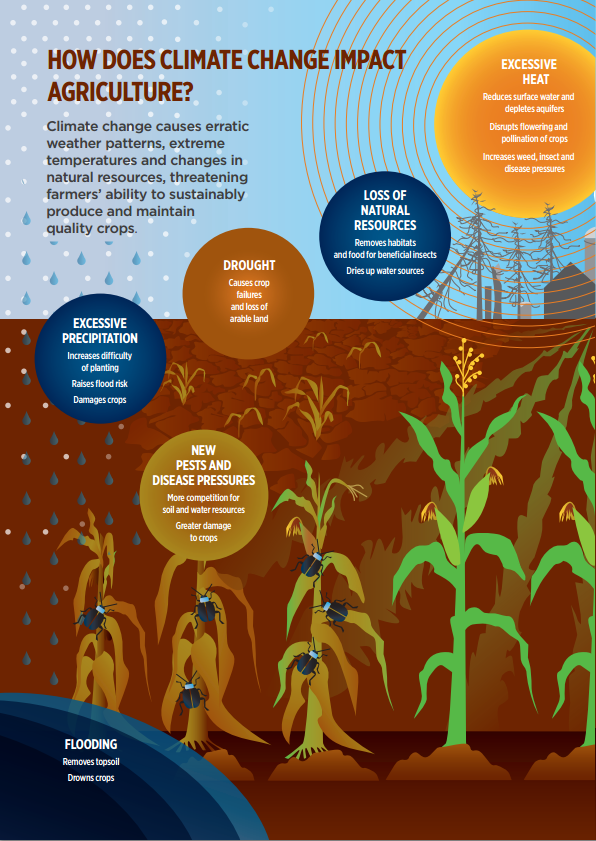Every greenhouse gas emission made in the world, adds greatly up to its own perils.
A carbon unit produced and released by the human activities can simply disturb different ongoing processes, shatter millions of lives though indirectly, yet with insurmountable helplessness.
This warming world is a bigger problem as the climate change reduces productivity while an increasing population (for now) demands more, threatening the overall productivity and food security.
Therefore, agriculture seems to be extremely vulnerable and responsive towards minute moderations arising out of climate change.
According to a recent report by CFA Institute along with Climate Bonds Initiative, agriculture is particularly vulnerable to climate change as well as the best player to bet on, in our race against the warming world.
Climate change impacts on Agriculture:
The global temperature rise, in due course, reduce yields of desirable crops while simultaneously triggering a rise in weed and pest proliferation.
Even the much-experienced alterations in rainfall patterns can increase the chances of temporary crop failures and long-run productivity declines.
Nearly more than half of the economically active population in developing countries in the first decade of 21st century i.e., 2.5 billion people relied completely on agriculture for their livelihoods and subsistence.
According to the Food Policy Report, research results could quantify the climate-change impacts on overall food security, and also the future investments which could possibly offset the negative consequences for human well-being.
The report has been titled: ‘Financing Sustainable Agriculture in India: Opportunities, Challenges, and the Way Forward‘ and hopes to invigorate change in the sector, pending since long.
Agricultural activity is the prominent source of livelihood for India’s 58% of current population and helped to assert food security when the country was struggling with hunger.
The report talked of a large gap that exists between the intention of investors, shifting towards sustainable finance and the actions needed to register a difference.
But is this difference formidable to cover? It can surely be abridged with right amount of finance in right areas.
It calls for rigorous measures by entities ranging from Indian banks to the venture capitalists (VC), multilateral development institutions or the Indian policymakers, which can help channelize private capital for sustainable agriculture.
“In India, we have a National Mission for Sustainable Agriculture (NMSA), which aims to evolve and implement strategies to make Indian agriculture more resilient to the changing climate”, explains the CFA head.
“However, to transition to more sustainable practices, farmers will need better policy, better tech, and more access to capital”.
Challenges in boosting sustainable agricultural practices in India:
The mobilization of large amounts of capital to work is required irrespective of the smaller nature of agricultural operations.
There is a dearth of an apt framework that can categorize and evaluate projects providing its impact and financial dimensions in a consistent manner.
Indian farmers are lesser aware of the climate-resilient, environment-friendly and sustainable farm practices, those can help a farmer mitigate and adapt to the changing climate needs.
Agricultural projects tend to have a comparatively long gestation periods, making them risky. Also, the assets involved like the agricultural land is difficult to collateralize, making the local banks wary of funding these farmers.
India is full of small and marginal farmers who barely have even documents asserting claims on their lands.
It is to note that the Central banks worldwide do not have any mechanism for climate-related risks to be quantified of risk weights.
Although the agricultural funding has just not been limited to worldly banks, rather other alternatives have been made available to transact and receive subsidies by the government.
Though the challenges may be abound, yet they are not impossible. They are only achievable with total will and concerted efforts, that too within time.
The CFA scientist explained further by saying: “Agriculture is particularly vulnerable to climate change, in terms of yields and nutritional content of grains. Therefore, financing the transition to sustainable, or climate-resilient, agriculture is vital”.
People may earn for a variety of their unfulfilled desires. For many, it is just to fill their stomachs and of the ones they love.
What if the one thing that barely sustains them and let them survive in the race, is gone berserk, with no definite patterns of cropping, diminishing even with correct inputs and simply, become the most uncertain thing to depend on, in future?




